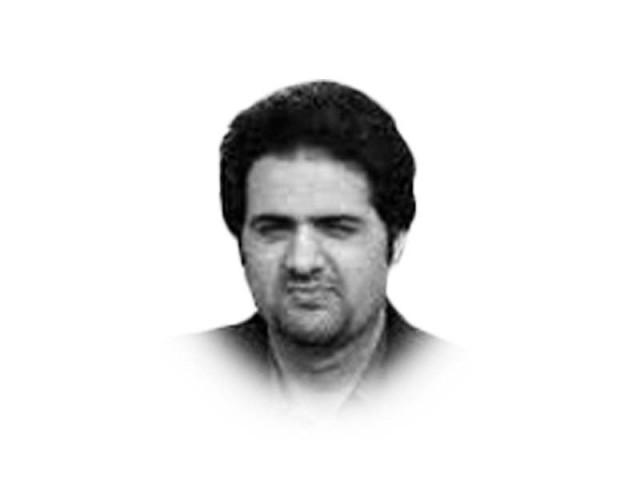Who will stand up for Palestine?
The reality is when strong nations do not want to do something they stick to the law and vice versa

The writer is a professor at the Lonestar College in Houston and also a PhD candidate at the University of Houston
Today, the leading scholars voicing concerns for Palestinians are not Muslims. The leading critics of Israel include Noam Chomsky and Norman Finkelstein, both of whom are Jewish by birth and do not see politics or scholarship from the lens of religion. They are ardent advocates of Palestinians’ rights. One of my friends and a fierce critic of Israel is David Barsamian.
The irony is that despite the existence of deep sympathy globally for the cause of Palestinians, nothing good happens for them only because citizens of just one nation do not know the truth. It is what propaganda does. In the wake of Trump’s recognition of Jerusalem as Israel’s capital, the OIC is also waking up and the first probe it sent down its consciousness was embraced with no surge of brilliance. Given that tit-for-tat style Jerusalem recognition, one cannot give a closer look at the member states of the OIC and not laugh.
I critique the declaration of the OIC not on legal or moral ground, but rather on the basis of pragmatism and truth. First of all, it would be interesting to know how many Americans actually know that Guinea-Bissau, Guyana, Togo and Suriname are countries and not some famous chess players or perhaps, Game Of Thrones characters. These are OIC member states.
Other member states include the Kingdom of Saudi Arabia (KSA), the UAE, Qatar, Yemen, Iran, Syria, Pakistan, and so forth. Only Iran and Syria might care about the OIC declaration. Syria — because it has been insulted and sanctioned by the West and has so far proven to be regime-change resistant. Iran — because it always likes to stand up to the US. Iran is also a victim of a vicious Israeli campaign against its nuclear programme, including the Stuxnet virus and assassinations of its great nuclear scientists. The KSA has been an American ally since 1940s when the Americans realised that the region represents “a stupendous source of strategic power, and one of the greatest material prizes in world history.” The two allies of convenience — since there is nothing common between them except their enemies — have together created and nurtured Islamic terrorism. They have just recently signed a $110 billion arms deal. It does not require extra talent to decipher whether the KSA would stand up to America for Palestinians.
When Saddam Hussein invaded Kuwait in 1991, the Palestinian Liberation Organisation had supported him. Palestinian support left a bad taste angering the Saudis because they feared to be Saddam’s next target for invasion. Around that time began the early steps towards a secret dialogue between the KSA and Israel. The recent leaked cable confirms that relations between the two states existed. It is about their collaboration in destabilising Lebanon by stoking tensions in the region and scapegoating Hezbollah and Iran for it. Saudi Arabia is too entangled in intelligence sharing and security matters with Israel for the brutal murder of Palestinians to register a blip on its radar.
Erdogan is at the forefront of recognising Jerusalem as Palestinian capital. Turkey is but different. Seymour Hersh in his book The Killing Of Osama Bin Laden mentioned Erdogan’s meeting with President Obama in the Oval Office where Erdogan laid stress on attacking Syria while waving his finger at Obama, which angered him. So, an alliance between Assad and Erdogan is unlikely. Furthermore, Turkey is a Nato member. It would be very interesting to know what Erdogan would do if any Nato member state comes under attack by any Palestinian terror group. Collective defence (Article 5) is at the heart of the Nato treaty. Likewise, if Turkey decides to install its embassy in East Jerusalem and comes under an Israeli attack and that can hardly be a hypothetical given Israel’s history, will Nato come to Turkey’s defence against Israel. Is Nato’s collective defence sacrosanct enough for the US to attack its battle tested soldiers on the beat?
On the other hand, by any stretch of imagination, would it be realistic to expect Qatar to do the magic? Qatar is home to al Udeid Air Base, which is the largest US military base in the Middle East, hosting some 11,000 US military personnel and accommodating up to 120 aircraft. This US Combined Air Operations Centre at al Udeid Air Base provides command and control of air power throughout Iraq, Syria, Afghanistan and 17 other nations.
The reality is when strong nations do not want to do something they stick to the law and vice versa. When weak nations do not want to do something, they stick to emotional rhetoric with words like ‘this is not helpful to achieve peace’ and so forth. Passing resolutions is a favourite tactic too. These things are only done, they do not really mean anything.
Published in The Express Tribune, December 19th, 2017.
Like Opinion & Editorial on Facebook, follow @ETOpEd on Twitter to receive all updates on all our daily pieces.















COMMENTS
Comments are moderated and generally will be posted if they are on-topic and not abusive.
For more information, please see our Comments FAQ